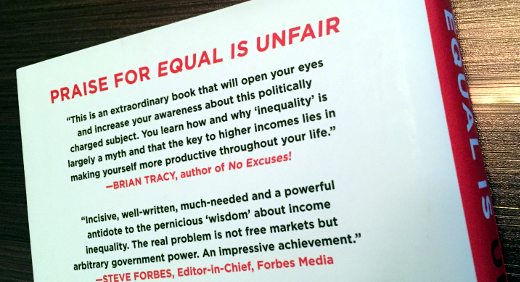My Takeaways From The Book Equal Is Unfair
This past spring I attended a debate held by Chicago Ideas Week between Dr. Yaron Brook, the executive director of the Ayn Rand Institute and Dr. James Galbraith, an economist and professor at the Lyndon B. Johnson School of Public Affairs at the University of Texas, on the topic “Is Equal Fair?” Where it was a debate about a heady topic, there was a good connection with the audience on the subject of equality and inequality in our society.
As someone who owned his own business and believes my success and failures are my own doing, despite all outside factors and influences, I personally take a more conservative look at this topic. That being said, I came into this debate with an open mind and was interested in hearing both sides to see how either could influence my thinking. In my humble opinion, Brook won this debate not only on substance but in style and how he presented complex economic models in simple terms.
After the debate I bought a copy of the book Brook co-authored with Don Watkins, an Ayn Rand Institute fellow, titled Equal is Unfair as I was interested in reading more on the points Brook made during the debate. As I expected, it is a very comprehensive book, with economic charts and data. However, it has an interesting and engaging narrative that explains well to the non-numbers person like myself without taking anything away from the topic.
As I read Equal Is Unfair, there were a few overarching takeaways I took from it, including:
Nothing Is Ever Equal – Other than a well-formed math equation, it is hard to say that all things are truly equal in the world, or can be. Many people have advantages in one area over others where they may have disadvantages in other areas with the same people. Especially in an ever-changing world, it’s hard to predict everything and keep things in equal, especially when there are unpredictable and unanticipated forces that may come along and have a negative impact, at first, and from which someone may recover or not.
By artificially trying to make something equal that naturally isn’t, it is simply going against a tide that is hard to maintain. Rather, do you look for another way, a Plan B, to gain advantage as compensation? For myself, I don’t look at being equal as the end goal.
What Do You Really Want? – The idea of equality is discussed in the book, as it was in the debate, to bring people in line with others who have better access to resources or information. To this end, I think to myself… is the goal for everybody to be equal, or to have the opportunity to be all the want to be?
Consider the Ripple Effect – Efforts to make all things equal may have unforeseen consequences, such as costs incurred or diverted, that have to be paid for somehow from somewhere. Anything new will have an impact on time and resources which are not infinite.
Whatever side you are on this issue or whatever your political and societal positions are on the topic of equality, I recommend reading Equal Is Unfair for a unique point of view on this topic.
This is from The Hot Iron, a journal on business and technology by Mike Maddaloni.
Did you enjoy this? Subscribe to The Hot Iron by RSS/XML feed or Read by Email.
Book Take-Aways • Strategize • (6) Comments • Permalink




